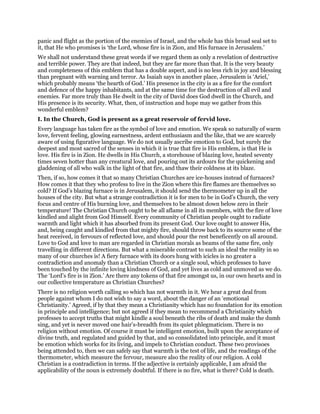This document provides commentary on Isaiah 31 from multiple scholars. It discusses the sin of relying on Egypt for help rather than trusting in God. The Israelites went down to Egypt for military assistance with horses and chariots against the Assyrians, despite being forbidden to do so. They did not seek God's counsel or make Him their friend. Relying on human strength and allies goes against relying on the Holy One of Israel, who is all-powerful and wise. Egypt and its forces are merely mortal while God is immortal.
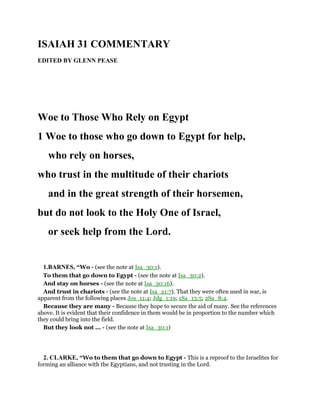
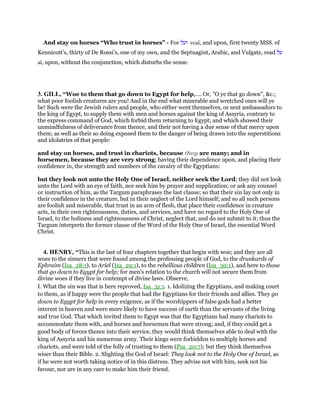


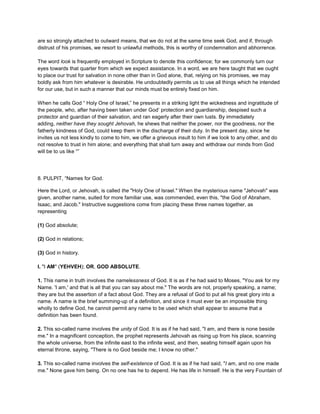





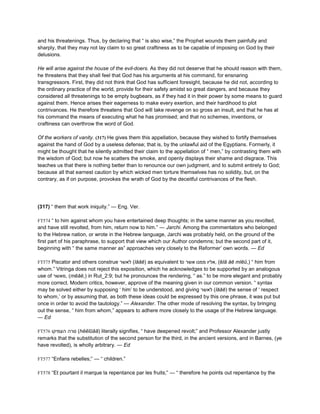
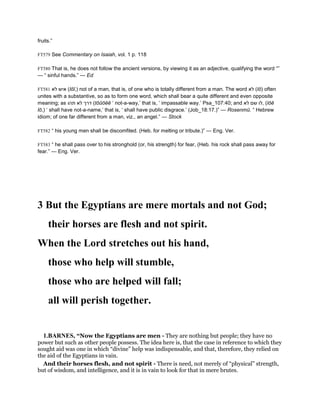



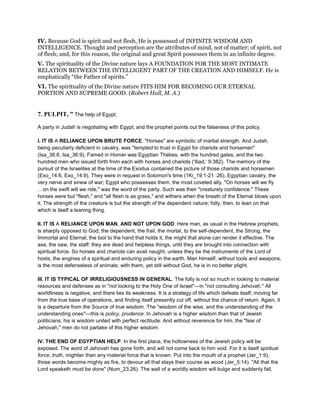
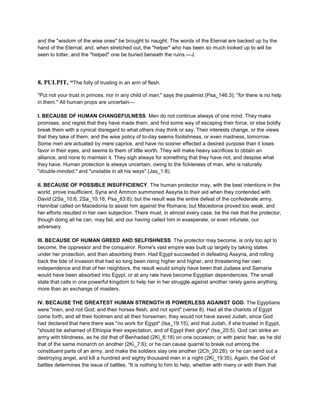



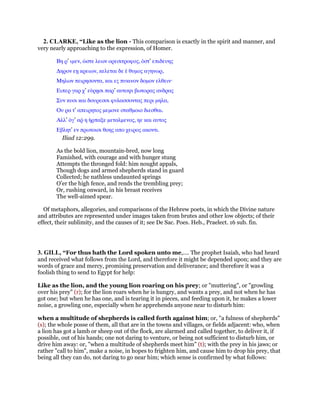
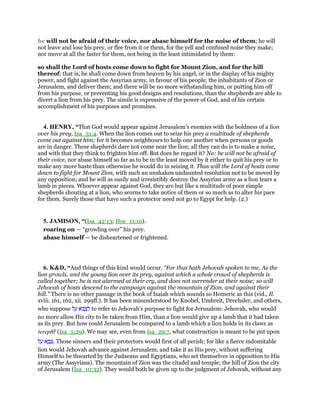


![chapter. Sennacherib, King of Assyria, had come against Jerusalem with a powerful, and, humanly
speaking, irresistible army. Many of the Jews, instead of looking to Jehovah for his gracious and merciful
protection, applied to Egypt for help, and carried their wealth to Egypt, in order to obtain it. God, offended
with this want of confidence in him, sent them word, that the Egyptians should help in vain, and to no
purpose; and that their real strength was, to sit still, and to rely on God alone [Note: Cite Isa_30:1-7; and
compare it with ver. 1–3.] — — — If they would with real penitence and faith rely on him, He would afford
them speedy and effectual deliverance. This assurance God delivered to them under the different images
which are contained in my text; which shew, not only what God would be to them, but what he will be to
his Church and people in all ages of the world.
Let me, with a special view to these images, point out to you,
I. The protection which God will afford to his people—
We are told, that, “as the mountains are round about Jerusalem, so the Lord is round about his people
from henceforth even for ever: and that they who trust in him shall be as Mount Zion, which cannot be
removed, but abideth for ever [Note: Psa_125:1-2.].” But, as the emergency that existed at the time the
prophet uttered my text was extremely urgent, so the images by which he was directed to encourage their
affiance in him were precisely such as were suited to the occasion. God promised to protect them—
With the firmness of a lion—
[A lion, growling over his prey, regards not the shouts of a multitude of shepherds: unmoved himself, he
infuses terror into them; and would soon make them repent of their temerity, if they dared to approach
him. And who shall prevail on Jehovah to relinquish his defence of Jerusalem? in reference to the
Assyrian army, which God was determined to destroy, the prophet says, “The Lord of Hosts hath
purposed; and who shall disannul it? and his hand is stretched out; and who shall turn it back
[Note: Isa_14:24-27.]?” The same also we may say in reference to the weakest of all his saints: “If God be
for you, who can be against you [Note:Rom_8:31.]?” “Who is he that shall harm you, if ye be followers of
that which is good [Note: 1Pe_3:13.]?” God is not only a tower of defence to his people to preserve them,
but “a wall of fire round about them,” that shall devour their assailants [Note: Zec_2:5.]. He may indeed
suffer the enemies of his people to prevail for a season; and they may vaunt, as the Assyrians did, of all
their conquests: but they are only as a rod in Jehovah’s hands; and all which they effect is only as the axe
or saw that accomplishes the will of him who uses it: but when they have effected his purpose, they
themselves, who sought nothing but to gratify their own ambition, shall be made monuments of his
righteous indignation: “The light of Israel will be to them for a fire, and his Holy One for a flame: and it
shall burn and devour his thorns and his briers in one day [Note: Isa_10:5-7; Isa_10:12-17.].” Yes, verily,
“God’s counsel shall stand, and he will do all his will [Note: Isa_46:10.]:” and “when He works, who shall
let it [Note: Isa_43:13.]?” “The Lion of the tribe of Judah [Note: Rev_5:5.]” shall assuredly prevail, though
all the powers of earth and hell were combined against him.]
2. With the tenderness of a parent bird—
[A bird, though utterly unable to cope with a bird of prey which it sees hovering over its nest, will fly to
protect its young; and, insensible to its own danger, will intercept its potent adversary, and rather perish
itself than give up its offspring to the devourer. And, “for our miseries is Jehovah grieved
[Note: Jdg_10:16.];” yea, in all our afflictions, too, our God himself is afflicted [Note: Isa_63:9.]:” and
whosoever “toucheth us, toucheth the apple of his eye [Note: Zec_2:8.].” When Pharaoh had overtaken
the Hebrews at the Red Sea, “the pillar of fire, which had hitherto led the fugitives, went and stood](https://image.slidesharecdn.com/isaiah31commentary-150301135116-conversion-gate01/85/Isaiah-31-commentary-25-320.jpg)
![between the Egyptian camp and them; so that they came not near to his people all the night,” during
which period an opening was made for their escape [Note: Exo_14:19-21.]. And in ten thousand
instances has God interposed for his people in every age; nor is there any one, who, if he could review all
the dealings of God towards him, might not find, in his own experience, some interpositions fully
answerable to the image that is before us.]
3. With the success of the attendant angel—
[At the destruction of the Egyptian first-born, Jehovah, the Angel of the Covenant, accompanied the
destroying angel; and, wherever he saw the blood of the paschal lamb sprinkled on the door-posts,
immediately interposed, and constrained the destroyer to pass over that house: in remembrance of which
marvellous deliverance, a feast was instituted, and was called “The Feast of the Lord’s Passover
[Note: Exo_12:23; Exo_12:27.].” To that the prophet, in my text, refers; saying, that “Jehovah, passing
over Jerusalem, will preserve it.” Now, so effectual was the Lord’s intervention in that instance, that, whilst
in every other house, throughout all the land of Egypt, the first-born both of man and beast was slain, in
the houses of the Hebrews died not so much as one [Note: Exo_12:29-30.]. And, when was so much as
one true believer ever left to perish? We are expressly told, that “it is not the will of our Father that one of
his little ones should perish [Note: Mat_18:14.].” No: however sifted his people be, “not the smallest grain
shall ever full upon the earth [Note: Amo_9:9.].” Behold the Apostle Paul: no less than forty persons had
bound themselves, by an oath, to murder him: and so well were their plans laid, that there did not appear
the slightest chance for his escape. But God so ordered it, that Paul’s own nephew overheard the plot,
and, by a timely mention of it to the governor, defeated it: and thus was that valuable life preserved
[Note: Act_23:12-24.]. Peter too, according to all human appearance, was consigned to death, there
being only a few hours to elapse before he was to be brought forth from prison for execution. But with
irresistible power did God cause the irons, with which his servant was bound, to fall off; and the prison
doors to open, as it were of their own accord: and thus was the stroke averted in the very instant that it
was about to fall [Note: Act_12:6-11.]. What dangers have awaited us, we shall never know till we stand
before our God in judgment: but then it will be found, that God has been our shield from numberless
assaults; and that, through the agency of his holy angels, we have “been kept, on ten thousands of
occasions, from dashing our foot against a stone [Note: Psa_91:11-12.].”]
Such being the security promised to us, let us consider,
II. Our duty resulting from it—
This merciful care, which God vouchsafes to us, doubtless calls for corresponding feelings on our part. If
he affords us such marvellous protection, we ought to surrender up ourselves to him in a way of,
1. Affiance—
[The fault of the Hebrews was, that they leaned on an arm of flesh, instead of relying solely upon God.
And we must be on our guard against this sad propensity. We are “not to say, ‘A confederacy, A
confederacy,’ with them that say, ‘A confederacy;’ but to sanctify the Lord God in our hearts, and to make
Him our fear and Him our dread [Note: Isa_8:12-13.].” The language of David should, under any
emergency whatever, be the language of our hearts: “Shall I lift up mine eyes unto the hills (to any earthly
powers)? From whence then cometh our help? Our help cometh from the Lord, who (is not only above
them all, but made them all, yea,) made heaven and earth [Note: Psa_121:1-2. Bishop Horne’s
translation.].” It is not possible for our confidence in God to be too strong, provided we leave to God the
time and manner of fulfilling his promises. He may, as he did in the case of Jerusalem, suffer matters to](https://image.slidesharecdn.com/isaiah31commentary-150301135116-conversion-gate01/85/Isaiah-31-commentary-26-320.jpg)
![proceed to the greatest extremity: but “the vision will come at its appointed time [Note: Hab_2:3.]:” and, in
a full assurance that it shall not tarry beyond that time, we should say, “Though he slay me, yet will I trust
in him [Note: Job_13:15.].” The well-known boast of the Apostle should be ours [Note: Rom_8:35-39.] —
— — And in dependence upon God, we should hurl defiance on all our enemies, even as Hezekiah was
taught to do in the very depth of his extremity [Note: Isa_37:22.].]
2. Gratitude—
[“If the Lord had not been on our side, now may Israel f the Lord had not been on our side when men rose
up against us, they had swallowed us up quick, when their wrath was kindled against us: then the waters
had overwhelmed us, the stream had gone over our soul [Note: Psa_124:1-4.].” Never, till all the wonders
of God’s love shall be revealed, shall we have any idea of the deliverances that have been vouchsafed
unto us, and of our obligation to God on account of them. “Satan, that subtle adversary, who beguiled our
first parents in Paradise, has, on thousands of occasions, sought to draw our minds from the simplicity
that is in Christ [Note: 2Co_11:3.]:” yea, “as a roaring lion, also, he has been seeking to devour us
[Note: 1Pe_5:8.].” And is it owing to our own wisdom or strength that we have not fallen a prey unto his
teeth? No: the Lord has interposed to screen us from his fiery darts; and has again and again rescued us
from the snares which he had laid for our feet. See how David was kept from shedding blood
[Note: 1Sa_25:32-33.], and Peter from utter apostasy [Note: Luk_22:31-32.]! and who can tell what evils
you might have perpetrated, and what your state might have at this moment been, if God had not “kept
you as the apple of his eye,” and “borne you, as on eagle’s wings,” throughout this dreary wilderness
[Note: Deu_32:10-11.]? I tell you, Brethren, that his visible interpositions for his people of old have been
only shadows of what he has invisibly done, and is at this moment doing, for you, if only you place your
trust in him: and that David’s acknowledgment is that which it becomes every one of you to make: “The
salvation of the righteous is of the Lord: he is their strength in the time of trouble. And the Lord shall help
them, and deliver them: he shall deliver them from the wicked, and save them, because they trust in him
[Note: Psa_37:39-40.].”]
3. Fidelity—
[Believing in God, we have nothing to fear, and nothing even to think of, but how we may best serve and
honour him. St. Paul, when in daily expectation of a cruel death, said, “None of these things move me,
neither count I my life dear unto me, so that I may but finish my course with joy, and fulfil the ministry
which I have received of the Lord Jesus [Note: Act_20:24.].” And I would ask, of all who believe the
declarations in my text, Should not such “love constrain you to live unto your God [Note: 2Co_5:14.]?”
Realize the determination which he formed from all eternity, and from which not all the wickedness of our
ruined world has ever been able to divert him, to save our souls from death by the sacrifice of his only
dear Son in our stead. Realize the merciful interposition of the Lord Jesus Christ between us and the
wrath of our offended God, and his actually becoming a curse for us. Realize his dying in our place and
stead, and by his own obedience unto death effecting a reconciliation for us, and purchasing for us all the
glory of heaven. Realize, I say, the deliverances shadowed forth by those vouchsafed to Jerusalem, and
spiritually fulfilled in you; and what, think you, will be your feelings on the occasion, or your expression of
them? Will there be any bounds to your love, any limits to your obedience, any intermission to your songs
of praise? No: you will be “ready either to be bound or to die for His sake,” who has “so loved you, and
given himself for you;” and “you will be satisfied with no attainment, till you shall awake up after the
likeness of his perfect righteousness [Note: Psa_17:15.].”]](https://image.slidesharecdn.com/isaiah31commentary-150301135116-conversion-gate01/85/Isaiah-31-commentary-27-320.jpg)
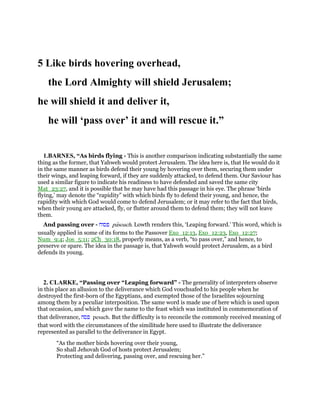


![flying — Rather, “which defend” their young with their wings; “to fly” is a secondary meaning
of the Hebrew word [Maurer]. “Hovering over” to protect their young [G. V. Smith].
passing over — as the destroying angel passing over, so as to spare the blood-marked
houses of the Israelites on the first passover (Exo_12:13, Exo_12:23, Exo_12:27). He passed, or
leaped forward [Lowth], to destroy the enemy and to spare His people.
6. K&D, “Jehovah suddenly arrests the work of punishment, and the love which the wrath
enfolds within itself begins to appear. “Like fluttering birds, so will Jehovah of Hosts screen
Jerusalem; screening and delivering, sparing and setting free.” The prophet uses the plural,
“like fluttering birds,” with an object - namely, not so much to represent Jehovah Himself, as the
tender care and, as it were, maternal love, into which His leonine fierceness would be changed.
This is indicated by the fact, that he attaches the feminine ‛aphoth to the common gender tsippo
rı̄m. The word pasoach recals to mind the deliverance from Egypt (as in Isa_30:29) in a very
significant manner. The sparing of the Israelites by the destroyer passing over their doors, from
which the passover derived its name, would be repeated once more. We may see from this, that
in and along with Assyria, Jehovah Himself, whose instrument of punishment Assyria was,
would take the filed against Jerusalem (Isa_29:2-3); but His attitude towards Jerusalem is
suddenly changed into one resembling the action of birds, as they soar round and above their
threatened nests. On the inf. abs. kal (ganon) after the hiphil, see Ewald, §312, b; and on the
continuance of the inf. abs. in the finite verb, §350, a. This generally takes place through the
future, but here through the preterite, as in Jer_23:14; Gen_26:13, and 1Sa_2:26 (if indeed ve
ga
del is the third pers. preterite there).
7. PULPIT 4-6, “Similes of the nature and power of Jehovah.
I. THE LION. He is pictured watching over the holy city, the "peculiar treasure," the invisible Sanctuary of
the religion and the people, as a lion over its prey, in the presence of threatening shepherds.
"As from a carcase herdsmen strive in vain
To scare a tawny lion, hunger-pinch'd;
Ev'n so th' Ajaces, mail-clad warriors, faird
The son of Priam from the corse to scare."
('Iliad,' 18.161.)
It is a fine image—found twice in Homer—of the undaunted prowess of the bold and steadfast warrior.
Invincible towards his foes, what is Jehovah towards his friends, the people of his choice and love?
II. THE BIRD. Infinite tenderness mingles with irresistible might in the nature of God. It is no narrow view](https://image.slidesharecdn.com/isaiah31commentary-150301135116-conversion-gate01/85/Isaiah-31-commentary-31-320.jpg)








![but he shall flee from the sword; from the drawn sword of the angel, who very probably
appeared in such a form as in 1Ch_21:16 which Sennacherib king of Assyria seeing, as well as the
slaughter made in his army by him, fled from it; in the Hebrew text it is added, "for himself" (y);
he fled for his life, for his own personal security; see 2Ki_19:36,
and his young men shall be discomfited; his choice ones, the flower of his army: or "melt
away" (z), through fear; or die by the stroke of the angel upon them: the sense of becoming
"tributary" seems to have no foundation.
4. HENRY, “Jerusalem's besiegers shall be routed, and so she shall be delivered from the
enemies about her walls. The former makes way for this. If a people return to God, they may
leave it to him to plead their cause against their enemies. When they have cast away their idols,
then shall the Assyrian fall, Isa_31:8, Isa_31:9. 1. The army of the Assyrians shall be laid dead
upon the spot by the sword, not of a mighty man, nor of a mean man, not of any man at all,
either Israelite or Egyptian, not forcibly by the sword of a mighty man nor surreptitiously by the
sword of a mean man, but by the sword of an angel, who strikes more strongly than a mighty
man and yet more secretly than a mean man, by the sword of the Lord, and his power and wrath
in the hand of the angel. Thus the young men of the army shall melt, and be discomfited, and
become tributaries to death. When God has work to do against the enemies of his church we
expect it must be done by mighty men and mean men, officers and common soldiers; whereas
God can, if he please, do it without either. He needs not armies of men who has legions of angels
at command, Mat_26:53. 2. The king of Assyria shall flee for the same, shall flee from that
invisible sword, hoping to get out of the reach of it; and he shall make the best of his way to his
own dominions, shall pass over to some strong-hold of his own, for fear lest the Jews should
pursue him now that his army was routed. Sennacherib had been very confident that he should
make himself master of Jerusalem, and in the most insolent manner had set both God and
Hezekiah at defiance; yet now he is made to tremble for fear of both. God can strike a terror into
the proudest of men, and make the stoutest heart to tremble. See Job_18:11; Job_20:24. His
princes that accompany him shall be afraid of the ensign, shall be in a continual fright at the
remembrance of the ensign in the air, which perhaps the destroying angel displayed before he
gave the fatal bow. Or they shall be afraid of every ensign they see, suspecting it is a party of the
Jews pursuing them. The banner that God displays for the encouragement of his people
(Psa_60:4) will be a terror to his and their enemies. Thus he cuts off the spirit of princes and is
terrible to the kings of the earth. But who will do this? It is the Lord, whose fire is in Zion and
his furnace in Jerusalem. (1.) Whose residence is there, and who there keeps house, as a man
does where his fire and his oven are. It is the city of the great King, and let not the Assyrians
think to turn him out of the possession of his own house. (2.) Who is there a consuming fire to
all his enemies and will make them as a fiery oven in the day of his wrath, Psa_21:9. He is
himself a wall of fire round about Jerusalem, so that whoever assaults her does so at his peril,
Zec_2:5; Rev_11:5. (3.) Who has his altar there, on which the holy fire is continually kept
burning and sacrifices are daily offered to his honour, and with which he is well pleased; and
therefore he will defend this city, especially having an eye to the great sacrifice which was there
also to be offered, of which all the sacrifices were types. If we keep up the fire of holy love and
devotion in our hearts and houses, we may depend upon God to be a protection to us and them.
5. JAMISON, “Assyrian — Sennacherib, representative of some powerful head of the
ungodly in the latter ages [Horsley].](https://image.slidesharecdn.com/isaiah31commentary-150301135116-conversion-gate01/85/Isaiah-31-commentary-40-320.jpg)
![sword, not of ... mighty ... mean man — but by the unseen sword of God.
flee — Sennacherib alone fled homewards after his army had been destroyed (Isa_37:37).
young men — the flower of his army.
discomfited — rather, “shall be subject to slavery”; literally, “shall be liable to tribute,” that
is, personal service (Deu_20:11; Jos_9:21) [Maurer]. Or, not so well, “shall melt away”
[Rosenmuller].
6. K&D, “The second motive is, that Israel will not be rescued by men, but by Jehovah alone;
so that even He from whom they have now so deeply fallen will prove Himself the only true
ground of confidence. “And Asshur falls by a sword not of a man, and a sword not of a man
will devour him; and he flees before a sword, and his young men become tributary. And his
rock, for fear will it pass away, and his princes be frightened away by the flags: the saying of
Jehovah, who has His fire in Zion, and His furnace in Jerusalem.” The lxx and Jerome render
this falsely φεύξεται οᆒκ (ּאל) ᅊπᆵ προσώπου µαχαίρας. לוֹ is an ethical dative, and the prophet
intentionally writes “before a sword” without any article, to suggest the idea of the unbounded,
infinite, awful (cf., Isa_28:2, be
yad; Psalter, vol. i. p. 15). A sword is drawn without any human
intervention, and before this Asshur falls, or at least so many of the Assyrians as are unable to
save themselves by flight. The power of Asshur is for ever broken; even its young men will
henceforth become tributary, or perform feudal service. By “his rock” most commentators
understand the rock upon which the fugitive would gladly have taken refuge, but did not dare
(Rosenmüller, Gesenius, Knobel, etc.); others, again, the military force of Asshur, as its
supposed invincible refuge (Saad., etc.); others, the apparently indestructible might of Asshur
generally (Vulgate, Rashi, Hitzig). But the presence of “his princes” in the parallel clause makes
it most natural to refer “his rock” to the king; and this reference is established with certainty by
what Isa_32:2 affirms of the king and princes of Judah. Luther also renders it thus: und jr Fels
wird fur furcht wegzihen (and their rock will withdraw for fear). Sennacherib really did hurry
back to Assyria after the catastrophe in a most rapid flight. Minnes are the standards of Asshur,
which the commanders of the army fly away from in terror, without attempting to rally those
that were scattered. Thus speaks Jehovah, and this is what He decrees who has His 'ur and tannu
r in Jerusalem. We cannot suppose that the allusion here is to the fire and hearth of the
sacrifices; for tannur does not mean a hearth, but a furnace (from nur, to burn). The reference is
to the light of the divine presence, which was outwardly a devouring fire for the enemies of
Jerusalem, an unapproachable red-hot furnace (ignis et caminus qui devorat peccatores et
ligna, faenum stipulamque consumit: Jerome).
7. PULPIT, “The surprise of the Lord's deliverances.
No inhabitant of Jerusalem could have imagined how God intended to deliver the city from Sennacherib.
God's way is in the sea, his footsteps are not known; but he leads his people safely like a flock. The
following points will recall familiar illustrations.
I. GOD'S PROMISED DELIVERANCES ALWAYS DO COME. "If it tarry, wait for it; it will surely come, it](https://image.slidesharecdn.com/isaiah31commentary-150301135116-conversion-gate01/85/Isaiah-31-commentary-41-320.jpg)




![bells and wheels and horses' feet, and no rest."
IV. GUILT FLEEING FROM THE FACE OF GOD. Guilt fleeing:
1. Weakly and vainly. Long before Jonah, in the hour of self-reproach that followed his act of
disobedience, "fled from the presence of the Lord," men had tried to put a distance between their sin and
its rightful Judge. And long since then have they tried to escape his eye and his hand. Saddest of all vain
endeavors is the thrice-guilty deed of the suicide, who acts as if, by entering another world, he could flee
from the face of the Omnipresent One.
2. But there is a sense in which guilt flies away from the face of God really and most blessedly. When
God's conditions of penitence and faith have been fulfilled, then is our guilt "purged away," our
transgressions are "removed from us as far as the east is from the west," our sins are "hidden from his
face," they are "cast into the depths of the sea" (Psa_65:3; Psa_103:12; Psa_51:9; Mic_7:19). Moreover,
we look forward to the time when there shall be a glorious fulfillment of the Divine promises, and we shall
have—
V. EVIL DISAPPEARING FROM THE FACE OF MAN; when "sorrow and sighing shall flee away," when
"death and hell shall be cast into the lake of fire," when "there shall be no more death, neither sorrow nor
crying for the former things are passed away" (Isa_35:10; Rev_20:14; Rev_21:4).—C.
5. JAMISON, “Rather, “shall pass beyond his strongholds”; he Shall not stop to take refuge
in it through fear (Jdg_20:47; Jer_48:28) [Gesenius].
ensign — the banner of Jehovah protecting the Jews [Maurer].
fire ... furnace — “light” and “fire,” namely, of Jehovah’s altar at Jerusalem (Isa_29:1).
Perhaps “furnace,” as distinguished from “fire,” may mean that His dwelling-place (His hearth)
was at Jerusalem (compare Isa_4:5); or else the fiery furnace awaiting all the enemies who
should attack Jerusalem.
6. MACLAREN, “THE LORD'S FURNACE
This very remarkable characterisation of God stands here as a kind of seal, set upon the
preceding prophecy. It is the reason why that will certainly be fulfilled. And what precedes is
mainly a promise of a deliverance for Israel, which was to be a destruction for Israel’s enemies.
It is put in very graphic and remarkable metaphors: ‘Like as a lion roareth on his prey when a
multitude of shepherds is called forth against him, he will not be afraid of their voice, nor abase
himself for the noise of them: so shall the Lord of hosts come down to fight for Mount Zion.’ The
enemies of Israel are picturesquely and poetically represented as a crowd of shepherds vainly
trying to scare a lion by their shouts. He stands undaunted, with his strong paw on his prey, and
the boldest of them durst not venture to drag it from beneath his claws. So, says Isaiah, with
singularly daring imagery, God will put all His strength into keeping fast hold of Israel, and no
one can pluck His people from His hands.
Then, with a sudden and striking change of metaphor, the prophet passes from a picture of the
extreme of fierceness to one of the extreme of tenderness. ‘As birds flying’-mother birds
fluttering over their nests-’so will the Lord of hosts defend Jerusalem,’ hovering over it and
going from side to side to defend with His broad pinions, ‘passing over, He will preserve it.’
These figures are next translated into the plain promise of utter discomfiture and destruction,](https://image.slidesharecdn.com/isaiah31commentary-150301135116-conversion-gate01/85/Isaiah-31-commentary-46-320.jpg)
